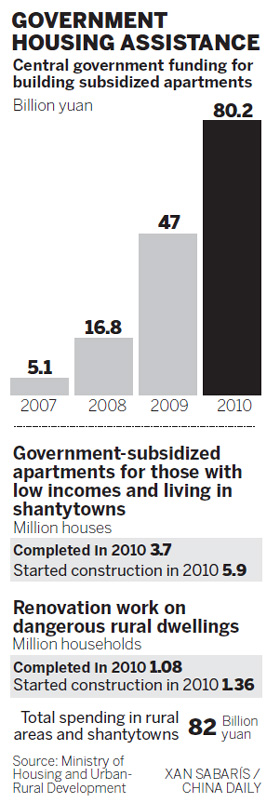InfoGraphic
China to build more low-cost apartments
By Jin Zhu (China Daily)
Updated: 2011-01-14 15:54
 |
Large Medium Small |
10 million units to be constructed for low-income families this year
Beijing - Construction of government-subsidized apartments accelerated in 2010, as part of a major effort to curb soaring property prices and provide housing for low-income earners.
The country last year started construction on 5.9 million subsidized apartments for low-income residents and shantytown dwellers, exceeding its original target by 100,000.
About 3.7 million subsidized houses had been completed by the end of December, Ministry of Housing and Urban-Rural Development figures showed.
The central government's 80.2-billion-yuan ($12.14 billion) investment in affordable housing last year surpassed any other year's, Minister Jiang Weixin said at the annual working conference in Beijing.
China started to commercialize housing in 1998. The move was made in concert with plans to provide affordable homes to low-income residents.
But local governments have been less than enthusiastic about constructing subsidized housing in recent years, because such projects require they supply of potentially lucrative land for free.
The affordable housing projects generate especially huge losses for local governments in big metropolises and some second-tier cities, where property prices have continued soaring. They could otherwise sell the land for vast amounts of money and increase their revenues.
Land transfer fees have significantly contributed to local governments' incomes. 
The fees generated more than 7 trillion yuan nationwide over the past five years, Ministry of Land and Resources figures showed.
The amount last year was 163.67 billion yuan in Beijing, which topped the nationwide list of cities with the fastest-growing housing prices.
To ensure local governments supply land for subsidized housing, the central government in May signed agreements with 31 provincial, municipal and autonomous region governments, as well as with the Xinjiang Production and Construction Corps. The central government has urged local governments to start construction before the end of July.
The move is viewed as a major push by the central government to address the housing problem after the National People's Congress - the country's top legislature - reported last year that provincial governments failed to fulfill their 2009 affordable housing construction goals.
Qi Ji, vice-minister of housing and urban-rural development, said in an online interview in May: "Local governments are responsible for ensuring the availability of land and for building more low-rent housing for low-income earners. A responsible system must be established to exercise effective supervision over the buildings' construction and quality."
More than 2.2 million hectares of land were earmarked for construction from 2006 to 2010. Of these, 45,333 hectares were set aside for subsidized housing, government figures showed.
The country has provided subsidized apartments to 11.4 million low-income families in urban areas over the past five years.
Land and Resources Minister Xu Shaoshi said the ministry will guarantee land for the construction of 10 million affordable homes this year.
However, the public has voiced concerns about construction quality and living conditions, as media have reported about several projects that were shoddily constructed or remotely located.
| ||||
In December 2010, it was discovered that a 107,000-square-meter project that included 15 subsidized apartment buildings in Wuhan, capital of Central China's Hubei province, had been built on toxic land that had been polluted by a chemical plant that previously occupied the site.
The Ministry of Housing and Urban-Rural Development has urged its branches at all levels to strengthen construction-quality supervision and focus on building public housing this year, the minister said.
Local governments have started to set targets for this year but have not released details.
But the insufficient funding that stifled such projects in recent years will become an even greater obstacle in 2011, analysts said.


